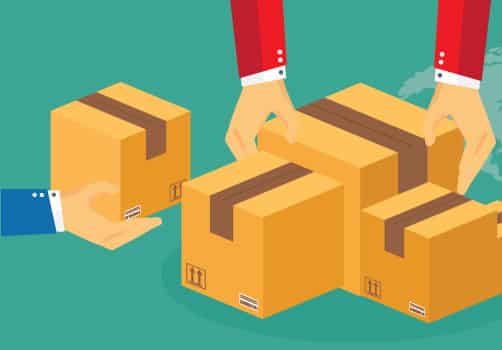Fulfilling orders on your own can be a real pain. For that reason, many savvy business owners outsource order fulfillment to companies like our own. They do it because it makes their life easier in a number of ways. But did you know you can also save money by outsourcing fulfillment as well?
Why Outsource Fulfillment in the First Place?
We’ve talked before about the telltale signs that your business needs to outsource fulfillment to a company like our own. You can read a more detailed article here, but we’ll summarize for simplicity in this post.
In general, there are six reasons you would outsource fulfillment:
- Your customer base is growing faster than you can keep up.
- You have so many orders that you’re either behind schedule or making mistakes.
- Employees are working overtime because of shipping.
- Handling fulfillment is making running your business too complicated.
- You’ve run out of space.
- You want to save some money.
Of all the above, that last point might be the most attractive reason of all, particularly in an economic downturn. You may be surprised to hear that we don’t talk about it that much.
That’s because saving money on order fulfillment isn’t as simple as saying “the service costs less than postage and supplies.” Indeed, third-party fulfillment saves money by removing incidental costs, or minor fees incurred just by doing business on a day-to-day basis.

How Order Fulfillment Services Are Priced
In order to understand how outsourcing order fulfillment can save you money, you first need to understand the third-party fulfillment pricing model. Naturally, we encourage you to request a quote so that we can tailor estimates around your particular situation. However, for the sake of this article, here is a simplified version:
Fulfillment Cost = Account/Storage Fees + (Packages Shipped * (Postage + Supplies + Pick and Pack Fee))
So let’s break that down by variable:
- Account/Storage Fees: the bare minimum charge that you must pay in order for us to hold your inventory.
- Packages Shipped: the number of packages that you ship in a month.
- Postage: the cost to ship an item.
- Supplies: the cost of special materials if needed. (Basic materials are included in the pick and pack fee).
- Pick and Pack Fee: the per-order cost of retrieving items, preparing them for shipping, printing and applying postage.
The Easiest Way to Understand Cost Savings
Services like ours are able to negotiate much lower postage rates and we can also order supplies for much cheaper than normal since we buy them in bulk. If you ship enough items through our service, the savings from postage and supplies will exceed the account/storage fees and pick and pack fees. In short, you save and we still profit.
Now there is an important caveat: in order to save money in this very simple way, you have to have a large and consistent order volume. Otherwise, you’ll break even or maybe spend a bit more on pick and pack or storage than you will save on postage and supplies.

Other Ways That Outsourcing Fulfillment Can Save You Money
All that said, even if you’re only shipping, say, 50-100 items per month, you might still save money by outsourcing fulfillment. That’s because of incidental costs that you won’t incur by outsourcing.
1. Better labor allocation
If you’re running a small business, odds are pretty good that your biggest expense is labor. Rightly so, too, people have to live on the money that you provide!
Even still, wasting your employees’ labor on a non-value-added activity is a sure way to overspend. If you’re shipping even 2 orders per day, that could take someone a significant amount of time. They have to pack items, print or buy postage, and get them in the mail. That adds up to an hour or two per week, which even for a relatively inexpensive employee – let’s say $15 per hour – that could add up to $15-30 per week, or $60-120 per month.
Add on healthcare benefits, unemployment taxes, FICA, Medicare, worker’s compensation, and other labor-related overhead, that turns into $25-50 per week, or $100-200 per month. Labor is just plain expensive!
If you can save your employees a little bit of time, they can spend that extra time generating revenue as opposed to doing grunt work like running to the post office.
2. Less overtime and training
Here is an extremely simple version of home-spun shipping:
- You order boxes and bubble wrap on Amazon.
- Print postage using PayPal and label paper.
- Schedule a pick-up with the post office.
In order to do this, you have to know what supplies to buy. You have to know how to print postage on PayPal and how to make their system play nice with your printer, which is likely an annoyingly difficult bit of hardware to use. Then you have to figure out how to coordinate with the USPS to pick up packages if they’re too big for the mail, or you have to run them by the USPS.
That’s the simple version. This isn’t a particularly difficult thing to do, but each step still requires training. Employees don’t just magically know how to do all these things. Someone has to take time to teach them and time is money.
On top of that, any one of those steps could end up taking longer than you think. Your printer could go out. You could run out of paper. Run to the post office, and get stuck in traffic. Any of these could lead to paying overtime.
All these things sound little, but they add up quickly.
3. No supply costs
Bubble wrap costs money, as does any external packaging that does not come from the USPS in the form of a flat rate mailing box or padded mailer. The supplies will add up quickly, one nickel and one dime at a time. If you outsource, these costs are mostly included in the much more predictable pick and pack fees, unless you request special packaging.

4. Lower storage costs
If you have a lot of items that you need to store, you have a couple of different options:
- Keep them in your workplace, reducing the amount of space that you can work with.
- Rent a storage unit.
The first option is cheapest, theoretically having zero additional cost. Even still, you lose useable real estate when you store your items on your own property, and that’s a cost, even if it doesn’t come with a clear price tag.
If you’re renting a storage unit, on the other hand, the additional cost is clear. It’s probably a big cost, too, since storage units are not cheap. On top of that, you also have the additional labor cost of taking items out of the storage unit to ship them, because that process takes time.
5. Reduced business complexity and greater process efficiency
This is a little bit more abstract, but let it sink in. If your business is overly complicated, it will be easy to forget what you’re doing. That makes it really difficult to prioritize. Environments that overburden your mind with constant to-dos keep you from spending your mental energy coming up with ways to generate revenue. Who knows how much that can cost in the long run?
Once you outsource fulfillment to a third-party company, you don’t have to worry about that. It makes your business simpler. You can focus on generating revenue because your processes are more efficient.
6. Reduced loss of revenue due to slow shipping
If you are having a hard time fulfilling orders accurately or on-time, it’s going to irritate your customers. Many of them will want refunds, and others will simply fail to return to your store. Either scenario means that poor customer service is costing you revenue.
By having a third-party fulfillment company ship on your behalf, you can reliably ship domestic packages in two or three days, ensuring good quality customer service in that regard. Plus, seasoned professionals are shipping the packages, which reduces the amount that will be damaged in transit or lost because of errors in shipping.
7. Gained revenue from better retention
Piggybacking off the last point, good shipping can make your customers more likely to buy again. If a good shipping experience, for example, makes your customers even 5% more likely to buy again, that means you will see significant revenue gains from customer retention. This isn’t, strictly speaking, saving money, but it is capturing money that you would not otherwise earn.
Final Thoughts
Outsourcing fulfillment is good for businesses for a variety of reasons. It greatly simplifies your day-to-day work, cuts down on wasted labor, and allows you to benefit from deeply discounted rates on postage and shipping supplies. Often times, the shipping bill after outsourcing will come in lower than the shipping bill before outsourcing. Even when it doesn’t, though, you may very well end up saving money in subtler ways!





